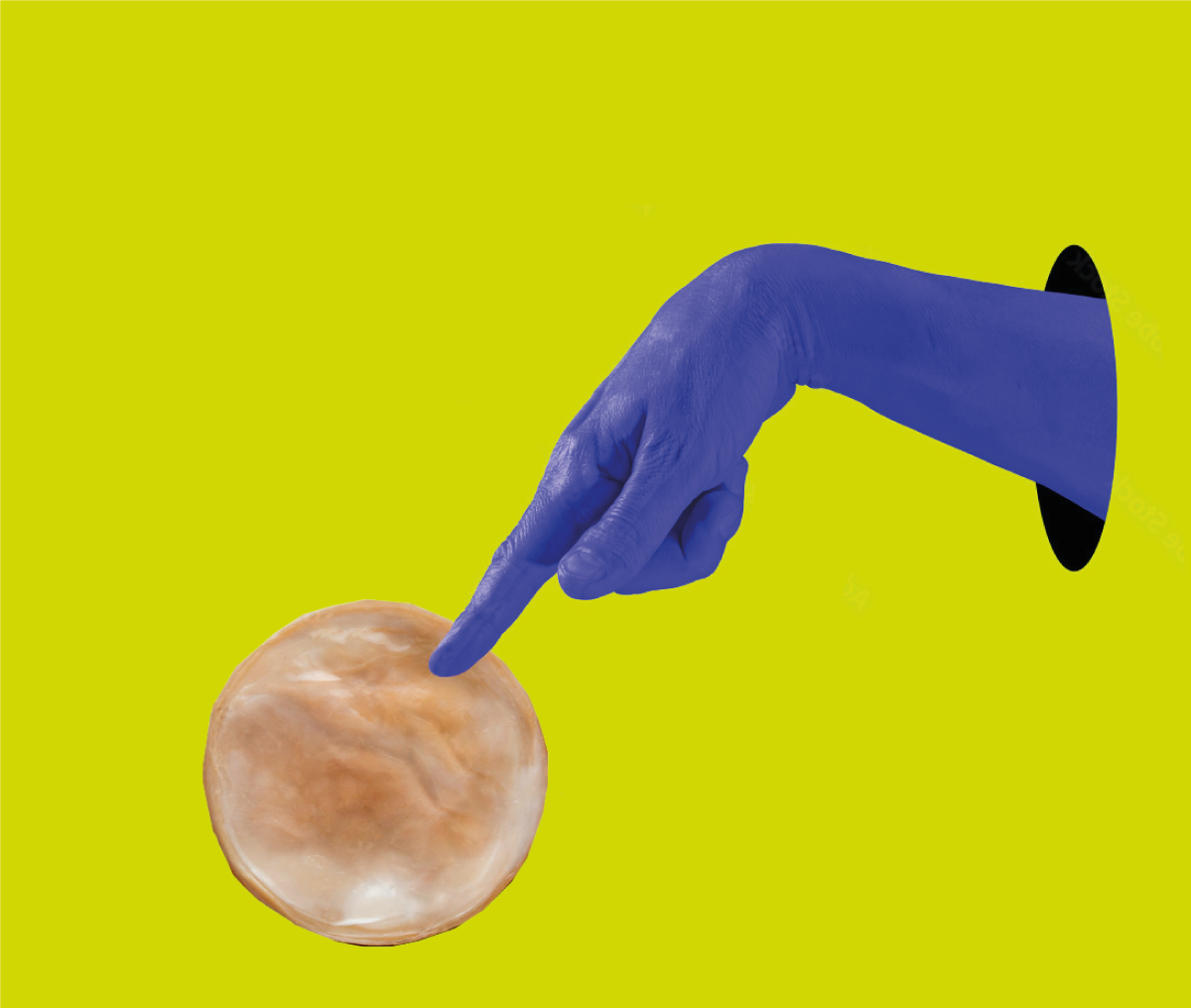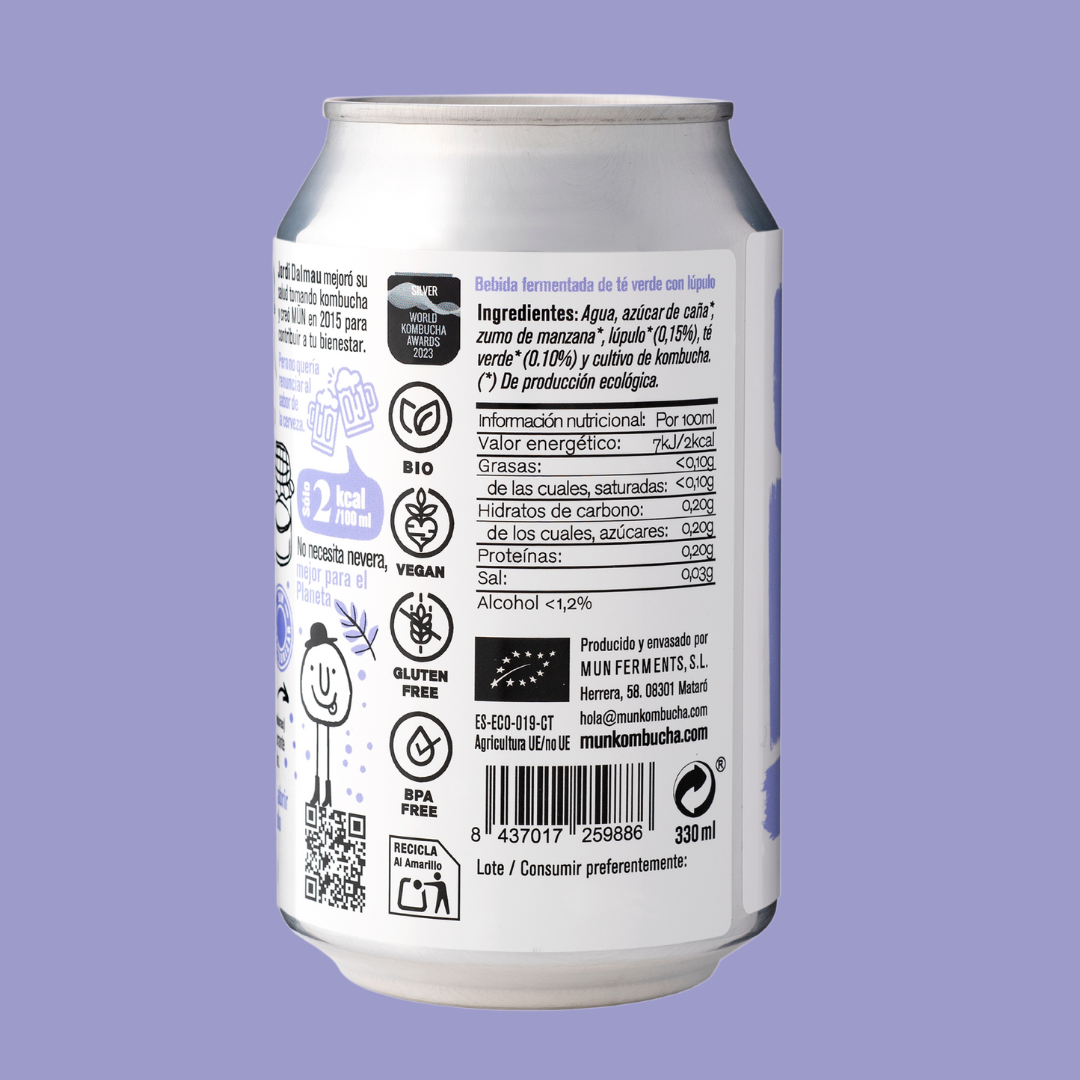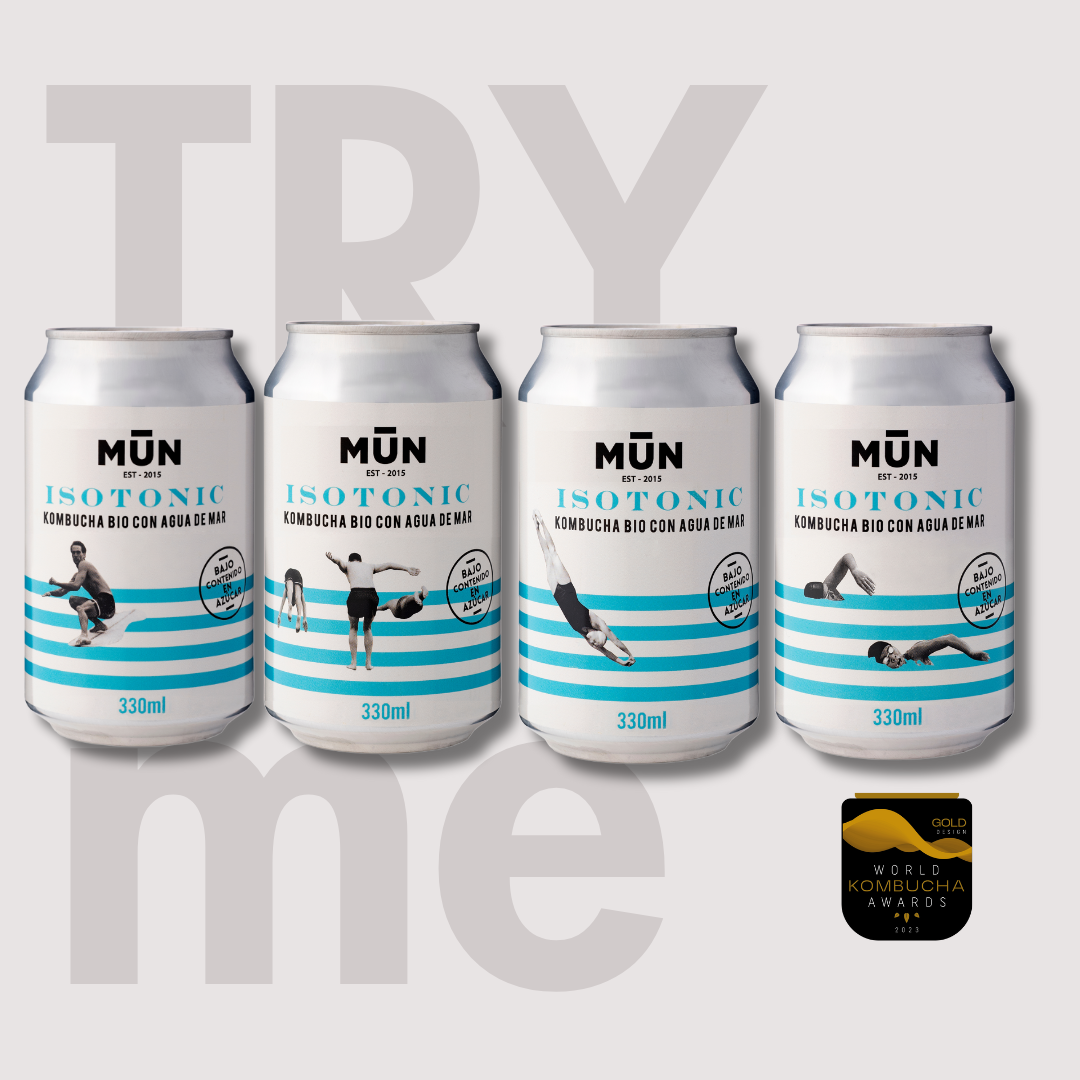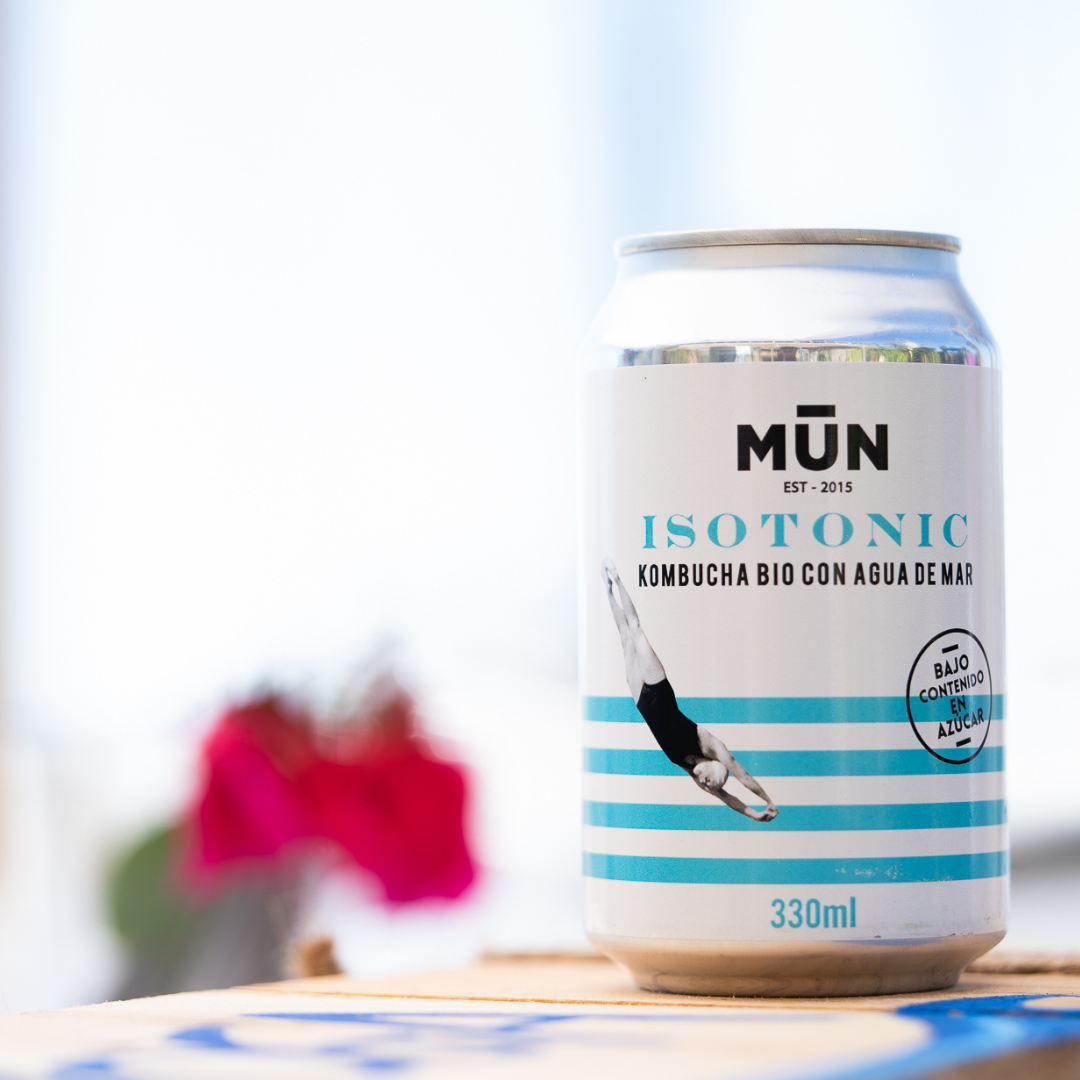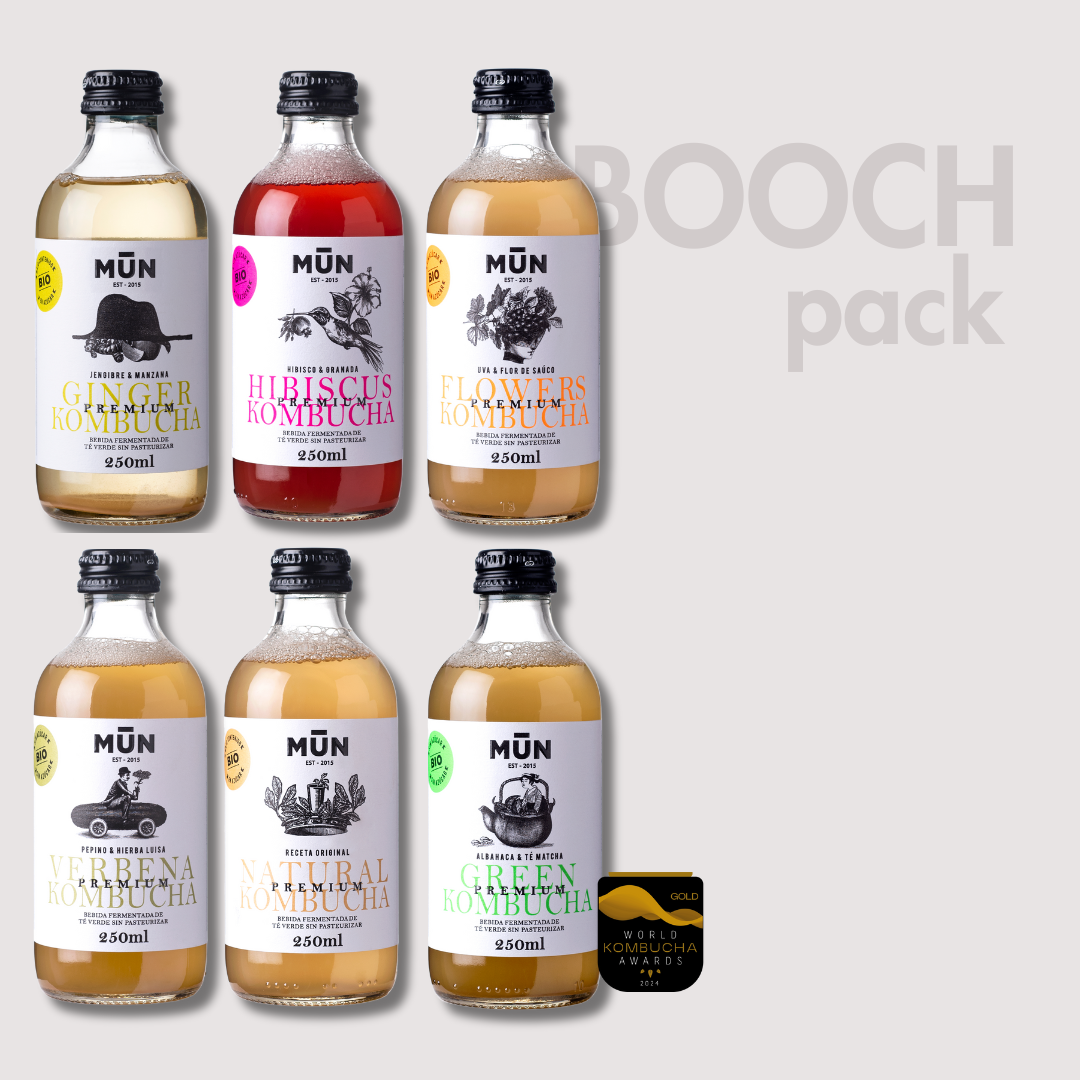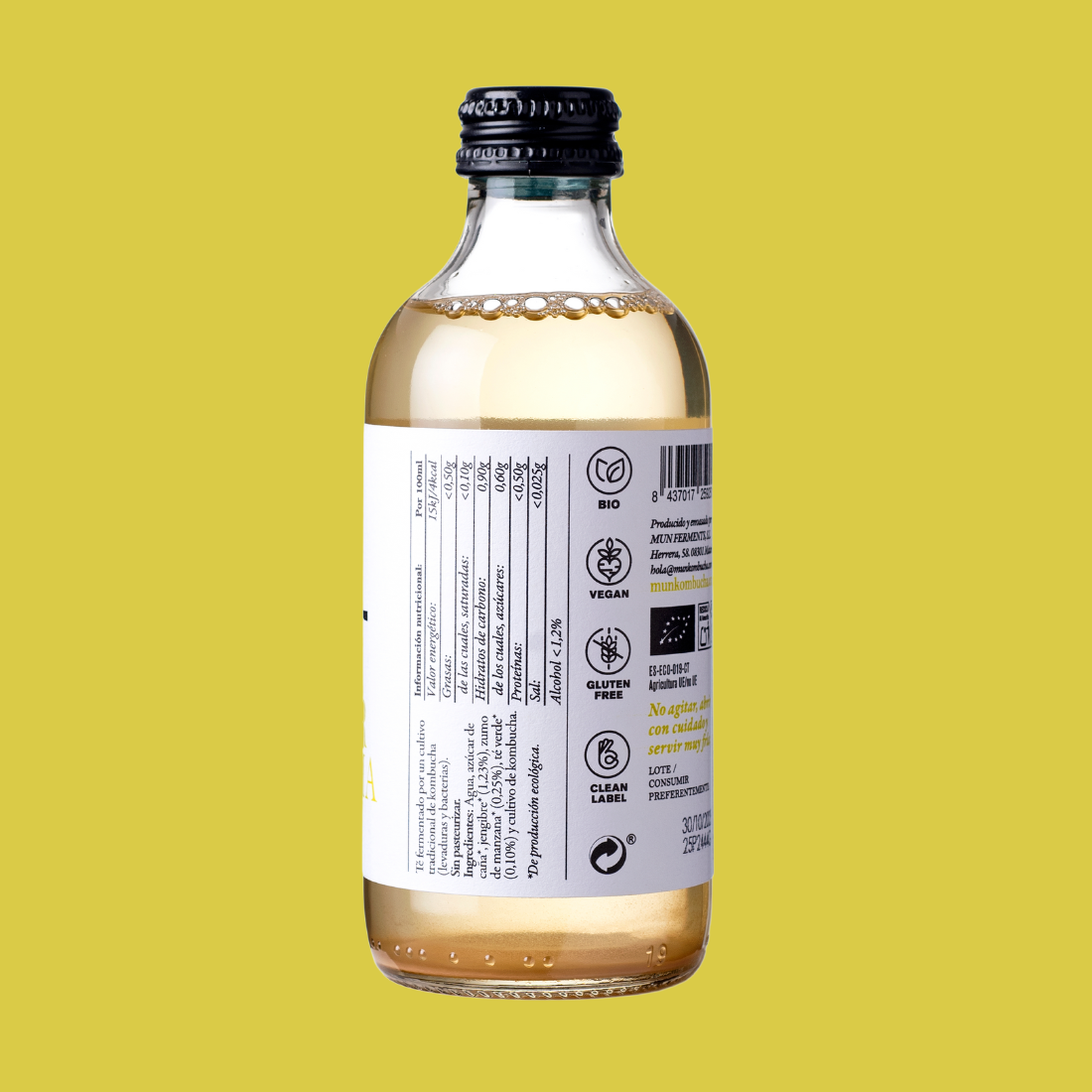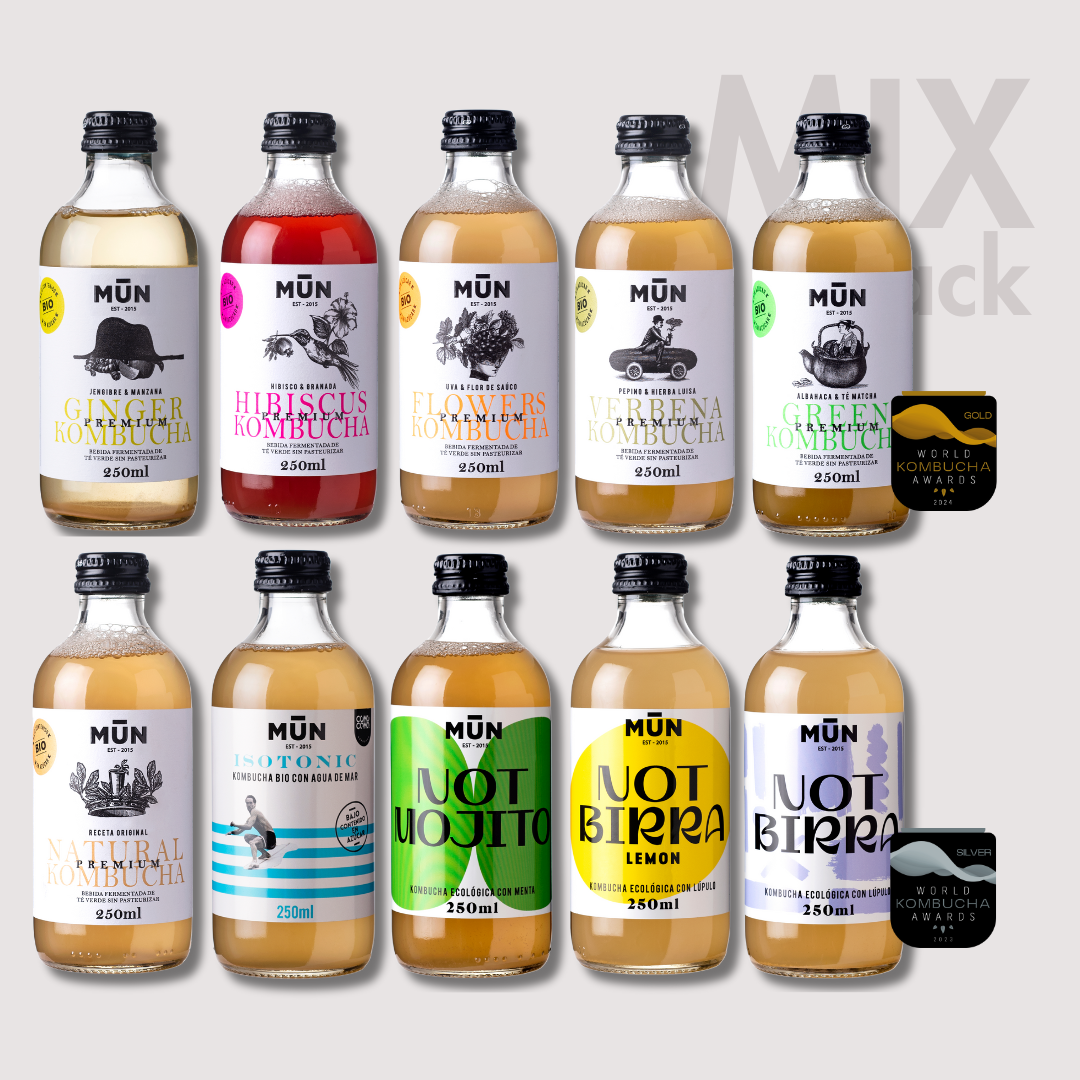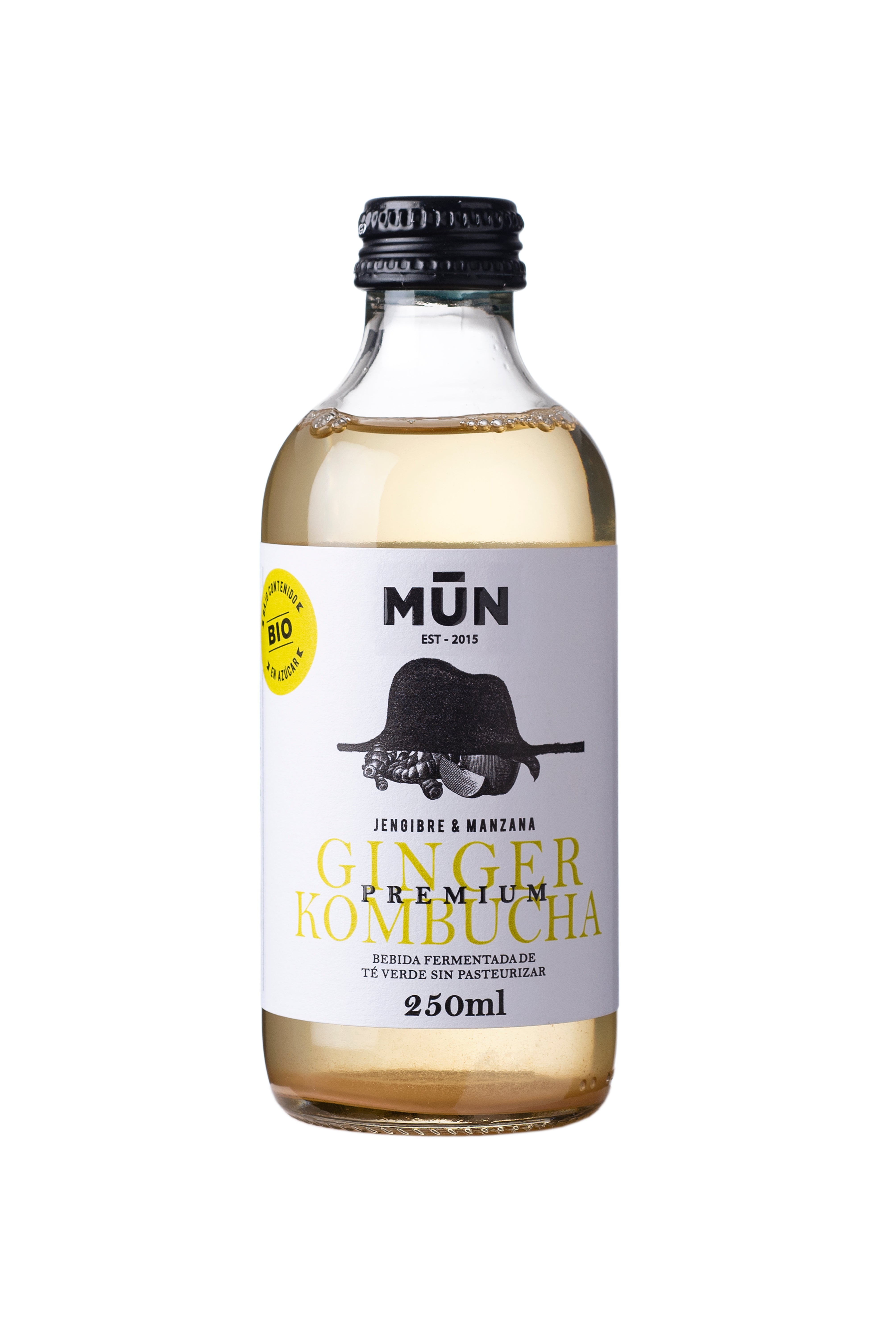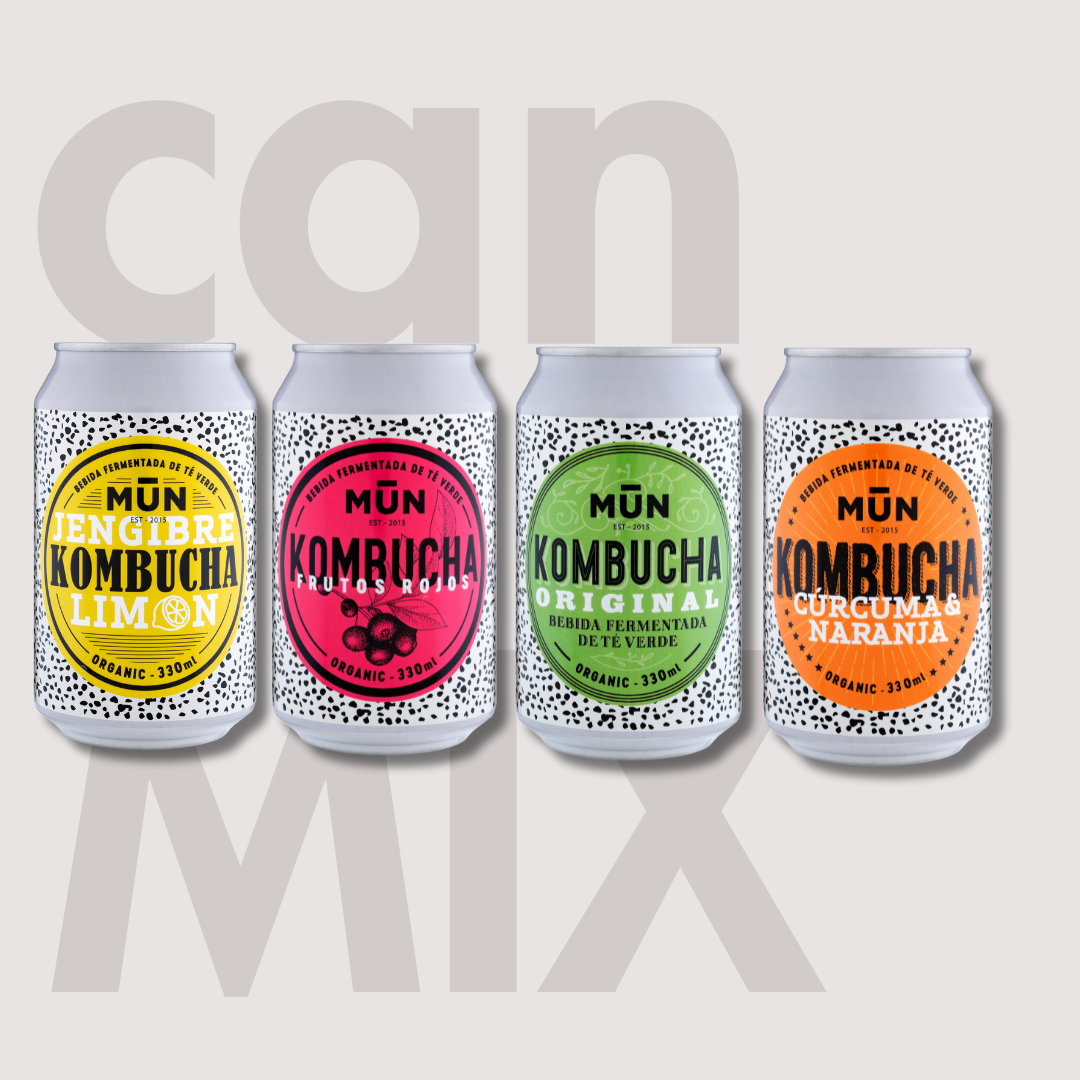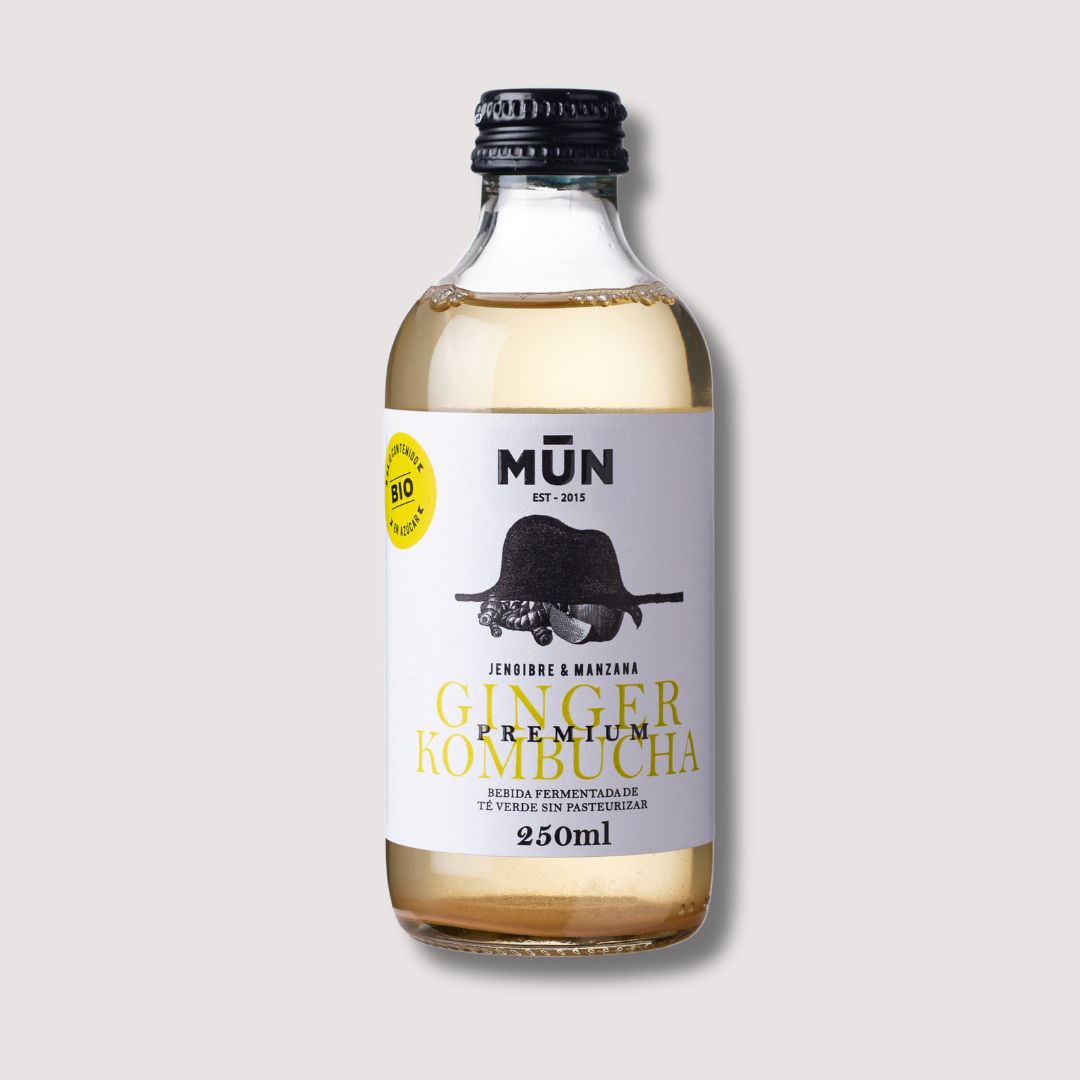Before we start, what are we doing on a website about kombucha talking about Gilbert's Syndrome? Well, very easy. One of the founders of Mun Kombucha, Jordi Dalmau, almost thirty years after being diagnosed with Gilbert's disease, found a solution to the symptoms it caused by drinking kombucha.
High bilirubin
At 13, in a routine blood test, Jordi's bilirubin value went through the roof. They did a test putting his body under stress conditions and the result was very clear: he suffered from Gilbert's Syndrome. The prognosis was to do nothing, a normal life, just keep in mind that in the blood tests the bilirubin value would always be altered. So it was. But as the years passed, other symptoms appeared: general fatigue, less and less tolerance for alcohol, frequent contractures, and increasingly frequent headaches.
Jordi went to a therapist and explained everything that was happening to him. The therapist confirmed that all the symptoms were related to the liver. In his specific case, he recommended eliminating paracetamol, reducing carbohydrate intake, increasing protein intake, reducing coffee, and eating as much of a variety of fermented foods as possible.
In a short time he began to notice some improvement. Little by little he introduced more and more fermented products.
He started with the easiest ones to find or make: sauerkraut , kimchi , pickles . Then it was the turn of kefir, first with milk and then with water.
Only kombucha was left on the list, but at that time it was impossible to find at the herbalist, so Jordi decided to make it himself. The result was spectacular. Within a few months of regularly drinking kombucha, especially on an empty stomach, the fatigue disappeared and, little by little, the headache stopped being a problem. Jordi had so much energy that he started the MUN KOMBUCHA project, but this is another story. If you want more detail, we explain it in this interview .
In his case, by following a low-carbohydrate diet, regularly drinking fermented foods, especially kombucha, controlling stress and sleep, and exercising regularly, the symptoms caused by Gilbert's Syndrome were under control.
After this introduction, we explain everything we have been collecting about Gilbert Syndrome. Ah! and we highly recommend that you go to the end to understand how kombucha can help you if you also suffer from it.
What is Gilbert Syndrome
Gilbert syndrome, named after the French gastroenterologist Nicolas Augustin Gilbert in 1901, is a benign, hereditary disease associated with an intermittently high level of bilirubin in the blood, caused by a deficiency of the enzyme glucuronosyltransferase . Gilbert syndrome is a genetic error that affects detoxification. The liver is not able to properly process bilirubin and remove it from the body effectively.
It usually produces mild jaundice under conditions of effort, stress, insomnia, surgeries, fasting, when there are infections or after ingesting some medications such as paracetamol, since the concentration of bilirubin in the blood increases in these situations. The syndrome causes fatigue , among other symptoms.
Gilbert syndrome is caused by a decreased ability to excrete bilirubin. When passing through the liver, bilirubin reacts with glucuronic acid, transforming it into "conjugated" or direct bilirubin, which allows it to dissolve in water and be excreted in the bile.
The enzyme that is responsible for conjugating bilirubin is called uridinediphosphoglucuronate glucuronosyltransferase (UGT) and its production is regulated by a gene that, if it has a certain mutation, causes less production of this enzyme. The UGT is reduced in Gilbert Syndrome to 31% of the normal value.
The prevalence of Gilbert syndrome can vary. In Africa it ranges between 15-25%, in Caucasian populations between 5-10% and in Asia 0-5%. It is usually detected more in men than in women.
What is bilirubin
Bilirubin is the result of the disintegration of red blood cells that have aged , presenting a yellow pigment. It circulates through the blood and reaches the liver, where it is eliminated through the bile ducts. It is then expelled in the feces. A small amount of bilirubin remains in the blood.
Liver detoxification pathways

Toxins are eliminated in the liver. This process is not immediate, as it requires two stages. In Phase I of the liver, a functional group of toxins is formed, modified or eliminated (oxidation, reduction or hydrolysis):
- Hydroxylation
- Epoxidation
- Dealkylation
- Deamination
- S- and N-oxidation.
The enzymes involved in phase I are called Cytochrome P450.
In Phase II these toxins combine with other substances and are eliminated through different routes. The result of the combination is easier to eliminate through the kidneys (in the urine) or the liver (in the bile). The phase II elimination routes are:
- Glucuronidation (glucuronic acid + toxin)
- Glycosidation (glucose + alcohol or thiol group)
- Sulfation (sulfur trioxide + toxin)
- Methylation (methyl group + toxic)
- Acetylation (acetyl group + toxic)
- Conjugation with GSH (glutathione)
- Conjugation with amino acids
What is glucuronidation
Glucuronidation is the process by which a glucuronic acid molecule combines with a toxicant , forming a glucuronide. This glucuronide is soluble in water and is the body's way of eliminating certain toxins. Those who suffer from Gilbert's Syndrome have the glucuronidation phase up to 31% slower than a person who does not suffer from it!
But through glucuronidation, not only bilirubin is eliminated, but other complexes are eliminated:
- Bilirubin (from the breakdown of old red blood cells)
- Retinoids (vitamin A components)
- Estrogens and testosterone
- BPA and BPS
- Cortisol
- Certain fatty acids (DHA, oleic acid, linoleic acid)
- A large number of medications , including paracetamol (acetomiphen)
- Certain pesticides
- Polycyclic aromatic hydrocarbons (PAHs – carcinogenic)
- Certain mold toxins
- Thyroid hormone (T3, T4)
This explains why those diagnosed with Gilbert syndrome can present with other ailments. The relationship between bilirubin and Gilbert's Syndrome is evident, since its high presence in the blood is responsible for the yellowish color of the skin (jaundice). Gilbert syndrome is related not only to bilirubin, but to all those compounds that are eliminated through glucuronidation.
What is the UGT1A1 enzyme
The UGT1A1 gene is essential for bilirubin conjugation. UGT1A1 is uridine diphosphoglucuronyltransferase 1, which is an enzyme that catalyzes the reaction that drives the conjugation of bilirubin with glucuronic acid .
Essentially, unconjugated bilirubin can take one of two paths:
- It can be converted back to biliverdin by acting as an antioxidant in the presence of reactive oxygen species.
- either - - It can be conjugated with glucuronic acid and then excreted in the feces.
The first pathway, acting as an antioxidant, may become important when cells produce many reactive oxygen species, such as in heart disease. And this is where the benefits of low UGT1A1 and therefore more bilirubin come into play. More on this below in the Gilbert syndrome benefits section.
With enough UGT1A1 available, more bilirubin will be conjugated and excreted.

Diagnosis: how Gilbert Syndrome is diagnosed
It is usually discovered in adolescence by accident, when a blood test shows high levels of bilirubin. The values in these patients range between 20 mmol/dl and 80 mmol/dl. Sometimes an ultrasound is performed to rule out other pathologies. It is also possible to perform a genetic test to study the UGT1A1 gene, but it is less common due to its cost and availability.
Symptoms of Gilbert Syndrome
High levels of bilirubin cause jaundice . Jaundice produces a yellowish color on the skin and conjunctivae of the eyes. Jaundice appears when a stimulus is given, such as excessive physical effort, stress, prolonged fasting, infections, insomnia, surgeries, some medications (paracetamol, chemotherapy, contraceptives...). Some people have reported generalized tiredness , decreased appetite , abdominal discomfort or nausea . It is also common to suffer from a headache , a feeling of hangover , and have a low tolerance for alcohol .
Does Gilbert Syndrome cause fatigue? Gilbert syndrome and fatigue:
Fatigue is one of the symptoms most reported by the Gilberts. Because? We explain it to you:
- Reduced liver function . If you eat highly refined carbohydrates like white bread or sweets, your blood sugar will go up and down a lot. This means that the enzyme we are deficient in cannot function as well since it needs sugar. The result is that your liver will not do its cleansing job effectively and certain toxins and bilirubin will build up in your body.
- Delayed gastric emptying . Food takes longer to leave the stomach if you have Gilbert syndrome. I'm sure many of you will be able to recognize the abdominal discomfort that this entails!
- Excess serotonin . People with Gilbert syndrome have defective processing of certain neurotransmitters (chemicals that send messages to the brain and nervous system). This can lead to elevated levels of serotonin, for example, which is linked to feelings of lethargy and lack of motivation, as well as anxiety.
Jaundice and symptoms of Gilbert syndrome
While many people are diagnosed with Gilbert syndrome through routine blood tests, others may have symptoms that prompt them to see a doctor.
In a survey of patients diagnosed with Gilbert syndrome, about half of them had recurrent jaundice. About half of people with recurrent jaundice reported abdominal pain, dyspepsia, or loss of appetite.
Risk factors associated with causing jaundice episodes included:
- Fasting for more than 12 hours.
- The pregnancy.
- low calorie diets.
- Alcohol consumption.
- Sleep less than recommended.
- Infections.
- Anesthesia.
- Intense physical activity.
Gilbert syndrome and paracetamol
Paracetamol, also known as acetaminophen , is a medication with analgesic and antipyretic properties that is prescribed to treat episodes of fever or mild or moderate pain. It is mainly eliminated through the liver by the metabolic pathway of glucuronidation. It is common for those who suffer from SG to have frequent headaches, and if they have not been contraindicated, they take paracetamol to relieve it. Without knowing it, what they are doing is burdening their liver even more. For this reason, paracetamol consumption is normally contraindicated in Gilberts.
This study investigated how Gilbert syndrome affects acetaminophen metabolism in 18 people with GS and 32 healthy volunteers. They found that people with GS have a heterogeneous metabolism, and in some cases, a reduction in acetaminophen glucuronidation and an increase in oxidation, which could increase the risk of liver damage after an overdose.
Treatment for Gilbert Syndrome
In general, Gilbert's Syndrome does not require treatment, but if the symptoms cause discomfort, ways can be sought to alleviate them or keep them under control. You have to act on 4 pillars:
- Good nutrition
- Physical exercise
- good sleep
- Mental resilience
Diet for Gilbert Syndrome
Treatment for Gilbert's Syndrome should be focused on reducing the toxins to be eliminated through glucuronidation or improving the performance of glucuronidation and UGT enzymes.
Reduce carbohydrate intake, especially those that come from refined foods, such as flour or sugars. Increase protein and fat consumption. Not enough studies have been done yet, but a paleo or keto diet could improve bilirubin levels .
Cruciferous vegetables cause the body to increase the production of UGT1A1. Cruciferous vegetables include broccoli, kale, Brussels sprouts, cauliflower, and cabbage.
If you don't eat enough cruciferous vegetables, I3C and DIM ( diindolylmethane ) supplements are available. These are produced from the part of cruciferous vegetables that induce UGT1A1.
Quercetin (a flavonoid supplement) and curcumin (from turmeric) increase the activity of the UGT enzyme, according to an animal study.
Star foods for the liver include: broccoli, garlic, turmeric, avocado, beets, apples, lemons and walnuts.
Prohibited foods with Gilbert Syndrome
In general there is no food to avoid. On the other hand, it is advisable to eat healthy and consume enough vegetables and fruits. It is also important not to skip any meals, that is, to find a routine, controlling that you eat enough calories each day and not fasting.
It is important to include foods rich in fiber to keep the liver healthy. Include fruits, vegetables, whole grains and legumes in your daily life.
Dehydration can also trigger Gilbert syndrome. Dehydration can cause increased bilirubin levels. Caffeine can also act as a diuretic. Drink enough to avoid dehydration and control your coffee intake.
The only food to reduce or eliminate would be alcohol .
Gilbert syndrome and alcohol
It is very common for those who suffer from Gilbert syndrome to have a lower tolerance for alcohol, or simply cannot tolerate it. Sometimes a small amount of alcohol can cause a disproportionate feeling of hangover.
Alcohol is metabolized very quickly in the body and is absorbed and metabolized before most other nutrients. About 20% is absorbed directly through the walls of an empty stomach and can reach the brain within a minute. Alcohol is metabolized in the stomach and small intestine before it is taken to the liver. The liver is the only organ in the body that can produce enough enzyme to oxidize alcohol at an appreciable rate. Alcohol affects every organ in the body, but its most dramatic impact is on the liver, as it permanently changes the cellular structure of the liver, impeding its ability to metabolize fats. If the liver cannot process all the alcohol it receives, the excess alcohol travels to all parts of the body. For people with Gilbert syndrome, alcohol will likely increase bilirubin levels and can cause a hangover that comes on quickly and can last for several days.
Gilbert syndrome and intermittent fasting
When you do not eat for 12 to 24 hours, the mobilization of bilirubin from fatty tissue increases, which can pass into the blood and trigger an episode of jaundice. Likewise, a very low-fat or low-calorie diet can also stimulate jaundice symptoms. Thus, some people with Gilbert syndrome choose to eat a high-fat paleo or ketogenic diet .
Physical exercise
Ideally, exercise should be a combination of activities that increase your heart rate and challenge your posture and muscles, both in terms of flexibility and density. Brisk walking combined with pilates is simple, free and energizing. Try to get around on foot. Even standing while doing another activity engages your muscles. Every little movement helps you stay fit and well. Introduce strength exercise, videos like this can help you .
Good quality sleep
Good quality sleep is vital for everyone. Also, and especially, for those who suffer from Gilbert's Syndrome. Research shows that our circadian rhythm (our biological clock) is really important when we feel awake and when we sleep well. Simply making sure your room is really dark can make a big difference to your body clock. Getting plenty of light in the morning will also help you feel alert and awake during the day and sleep better at night. Also avoid blue light.
Mental resilience
Mental resilience is a quality that many of us feel we could develop more of. It allows you to put life's ups and downs into perspective. With mental resilience, you will cope better when something bad happens in your day or life, and you will worry less about it. That doesn't mean you shouldn't worry, get angry, grieve, or have no feelings. It means you can do those natural things and then move forward in time. You can also consult this page to improve your resilience .
Gilbert syndrome and depression
Recent studies suggest that there could be a connection between this syndrome and depression. This relationship is not necessarily due to the direct nature of the liver disorder, but rather how chronic symptoms , such as fatigue and malaise , can impact the emotional and mental well-being of individuals. Constantly managing a chronic health condition, along with a decreased ability to participate in daily activities, may increase the risk of developing depressive symptoms. Therefore, it is essential that patients with Gilbert Syndrome receive comprehensive care that addresses both the physical and psychological aspects of the disease , ensuring a holistic approach to their overall well-being.
Gut microbiome and bilirubin
Once bilirubin is conjugated with the enzyme UGT1A1, it is released into the intestines from the liver through bile. Bacteria in the intestinal microbiota then deconjugate glucuronic acid from bilirubin. Bilirubin is then oxidized and reduced, eventually forming stercobilin (excreted in feces) or urobilin (reabsorbed and excreted in urine).
The deconjugation reaction is facilitated by β-glucuronidase , an enzyme produced by intestinal bacteria. Therefore, the gut microbiome affects how bilirubin is excreted through urine or feces.
Benefits of Gilbert Syndrome
As strange as it may seem, having Gilbert Syndrome, apart from causing certain discomfort, could present some benefits. Not everything has to be bad news!
Protection against cardiovascular risk
It is still unclear why bilirubin has an antioxidant effect, but various analyzes have found a significant decrease in the risk of coronary heart disease in individuals with Gilbert's Syndrome.
Protection against atherosclerosis
The most significant benefit of elevated bilirubin is a decrease in atherosclerotic plaque buildup.
Protection against Chronic Respiratory Diseases
A study from the United Kingdom looked at the effect of Gilbert syndrome on the risk of respiratory diseases in people born in 1946. Many people in this cohort had smoked, and those with Gilbert syndrome were less likely to have COPD or asthma than those with Gilbert syndrome. who had normal bilirubin.
Protection against fatty liver disease
Animal studies show that UGT1A1 variants that increase bilirubin also decrease the risk and severity of fatty liver disease (NAFLD). A meta-analysis that included more than 100,000 participants found that higher bilirubin levels are associated with lower odds of NAFLD.
Overall decrease in mortality
A research study of over 4,200 people with Gilbert syndrome and ~22,000 with normal bilirubin found that the mortality rate for those with Gilbert syndrome was lower. The results showed that the adjusted mortality rate was approximately 50% lower in people with Gilbert syndrome.
Toxic substances and Gilbert's syndrome
The UGT1A1 gene is also responsible for breaking down BPA (into plastics) and BPF. Those who suffer from this condition should avoid these substances.
The chemicals perfluorooctanoate (PFOA) and perfluorooctane sulfonate (PFOS) inhibit UGT1A1.
Medications contraindicated with Gilbert Syndrome
The most commonly used medication that those suffering from Gilbert's Syndrome must avoid is acetominophen , better known as paracetamol , since its elimination occurs precisely through the liver's glucuronidation phase. Also on the list to avoid are statins , gemfibrozil , irinotecan , and nilotinib .
Celebrities with Gilbert Syndrome
Some studies have suggested that Napoleon may have suffered from Gilbert's Syndrome . In fact, it is documented that he regularly presented jaundice and other symptoms that would match this ailment.
More recently, in 2017, the German MotoGP rider, Jonas Folger , had to interrupt his participation in the competition due to an outbreak caused by Gilbert Syndrome. "The last 6 weeks have been very difficult for me, not knowing what was happening to me or why my body has completely shut down," he clarified after the episode.
Paz Padilla , actress and television presenter, made a statement pointing out that she was "abstained for life." According to him, the reason why he does not include alcohol in his life is because he suffers from Gilbert's Syndrome and literally cannot tolerate its intake. "I don't digest alcohol, I don't assimilate it," Padilla said.
Jordi González , television presenter, is also affected by this ailment. González has reported extensively on how suffering from Gilbert's Syndrome influences him. Among others, he has indicated that he also has an intolerance to alcohol.
Can kombucha help with Gilbert syndrome?
For correct elimination of toxins through glucuronidation , which is reduced in the case of Gilbert's Syndrome, glucuronic acid is necessary. Glucuronic acid is produced in the liver, and combines with toxins so that they are soluble in water and can be expelled from the body. Numerous studies confirm that kombucha, as a result of fermentation, has small amounts of glucuronic acid. Additionally, kombucha contains saccharic acid. Saccharic acid also intervenes in the glucuronidation process, but in a different way: glucuronidase is an enzyme that is produced in our intestine and breaks the bond between a glucuronic acid molecule and a toxin.
Well, saccharic acid inhibits glucuronidase, thereby increasing the yield of glucuronic acid produced by the body! If you want to read even more information in this regard, Marc Vergés explains it in this article he wrote for our blog .
If you suffer from Gilbert's Syndrome, it may be a good idea to start drinking kombucha on a recurring basis. Keep in mind that kombucha may contain small amounts of alcohol. Some Gilberts cannot even tolerate these low amounts of alcohol. Start with small amounts of kombucha and see how your body reacts. If you see that it has no negative effects on your body, progressively increase the amount of kombucha you drink daily, and look for a balance point.
Frequently asked questions about Gilbert Syndrome
-
What is Gilbert Syndrome?
- Gilbert Syndrome is a common, benign genetic condition that affects the way the liver processes bilirubin, a waste product from the breakdown of red blood cells.
-
What are the symptoms of Gilbert Syndrome?
- The most common symptoms include mild jaundice (yellowing of the skin and eyes), fatigue, and in some cases, abdominal pain. Many people with this condition do not experience noticeable symptoms.
-
Is Gilbert Syndrome dangerous?
- No, it is generally not dangerous. It is a benign condition that rarely leads to serious health problems.
-
How is Gilbert Syndrome diagnosed?
- It is often diagnosed by blood tests that show elevated levels of indirect bilirubin, especially after fasting or during periods of illness.
-
Is there any treatment for Gilbert Syndrome?
- No specific treatment is required for Gilbert Syndrome, as it generally does not cause significant health problems. Management of symptoms, when necessary, is usually sufficient.
-
Can Gilbert Syndrome cause complications?
- In most cases, it does not cause serious complications. However, jaundice and fatigue can be concerning for some individuals.
-
Is Gilbert Syndrome hereditary?
- Yes, it is an inherited genetic condition. It is transmitted from parents to children through an autosomal recessive pattern.
-
: Can consuming kombucha be beneficial for people with Gilbert's Syndrome? Consuming kombucha may offer some benefits to people with Gilbert's Syndrome, although scientific evidence is limited and results may vary between individuals. Kombucha is known for its content of glucuronic acid , a compound that plays a role in liver detoxification , a process that may be compromised in people with this syndrome. By facilitating the conjugation and elimination of bilirubin, glucuronic acid could help manage levels of this substance in the body. However, it is important to note that kombucha may also contain small amounts of alcohol and caffeine, substances that cause some people with the syndrome. Can Gilbert Syndrome affect pregnancy?
- In most cases, it does not affect pregnancy or cause complications during pregnancy. However, it is important to inform the doctor about this condition.
-
How does Gilbert's Syndrome affect diet?
- It does not require a special diet, but it is recommended to avoid prolonged fasting and excessive alcohol consumption, as they can raise bilirubin levels.
-
Is there a connection between Gilbert Syndrome and depression?
- Although there is no direct relationship, managing any chronic condition, including Gilbert Syndrome, can affect emotional well-being and contribute to depression in some cases. It is important to address these aspects with a health professional.


